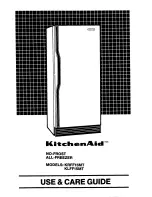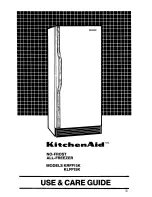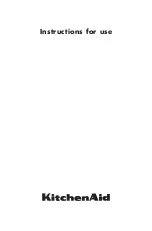
In most climates, defrosting will be necessary
only about twice a year.
7RKDYH\RXUIUHH]HURSHUDWHPRVWHIILFLHQWO\do
not permit more than 1/2" (13 mm) of frost to
accumulate on the shelves.
To remove frost, scrape with a plastic or wood
spatula or scraper.
Do not use an ice pick or sharp-edged
instrument DVLWPD\GDPDJHRUVFUDWFKWKH
IUHH]HU
Do not use any electrical device in defrosting
your freezer.
For Complete Defrosting
Turn the temperature control to the OFF
position and unplug the freezer.
Remove all food and place it in corrugated
boxes, insulated bags, picnic coolers, etc.
Use towels and newspapers for insulation
as needed.
With the door/lid open, use pans of hot
water to speed loosening of frost. Remove
large pieces before they melt.
Chest models have a defrost water drain at
the front.
NOTE: :DWHUPD\GULSIURPWKHEDFNIODQJH
RIWKHOLGFRYHUGXULQJGHIURVWLQJ7KLVLV
QRUPDO,FHEXLOGVXSLQWKHOLGLQVXODWLRQ
ZKHQWKHOLGLVRSHQIRUDGGLQJRUUHPRYLQJ
IRRGDQGPHOWVGXULQJWKHGHIURVWLQJ
RSHUDWLRQ
Sponge excess water from the bottom of
the freezer as it collects to prevent
overflowing.
After defrosting, clean the inside of the
freezer (see &DUHDQG&OHDQLQJ).
Replace the drain plug inside the cabinet
and the cap on the defrost drain. Fold over
and dry the gasket on the hinge side of the
lid.
Plug in the freezer. Return the temperature
control to its previous position and return
food to the freezer.
5
Defrosting instructions.
GEAppliances.com
Summary of Contents for FCM5SKWH
Page 12: ...Notes 12...






































